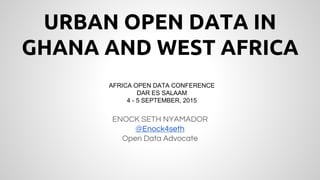Urban Open Data in Ghana and West Africa
- 1. URBAN OPEN DATA IN GHANA AND WEST AFRICA ENOCK SETH NYAMADOR @Enock4seth Open Data Advocate AFRICA OPEN DATA CONFERENCE DAR ES SALAAM 4 - 5 SEPTEMBER, 2015
- 4. OPENSTREETMAP IN GHANA ŌØÅLocal and remote mappers together ŌØÅPutting Ghana on the map ŌØÅCreating a free map
- 8. CODEFORGHANA
- 11. VISUALIZING DUMSOR WIKIPEDIA PAGE VIEWS
- 13. Odekro ŌØÅProvides information on parliamentary debates and outcomes ŌØÅBringing citizens closer to parliament by enabling access
- 15. CHALLENGES ŌØÅData formats and access to data ŌØÅDocumentation ŌØÅInternet access ŌØÅVolunteers
- 16. WAY FORWARD ŌØÅGo beyond visualization ŌØÅMapping flood resilience in Ghana ŌØÅSkills sharing ŌØÅNot only Open Data Portals ŌØÅBuild more lasting communities
Editor's Notes
- #2: Somebody might ask, what is someone so young coming to a high-level conference like this? Even coming to speak on Urban Open Data alongside such distinguished panel. YouŌĆÖre right. Open Data is for everyone, for anyone with the skills and interest in Open Data needs not to be left out. Whether you are a student or President, openning up data
- #3: Lots going on in Ghana Vibrant diverse community across Ghana from public sector to NGOs
- #4: Open Data is not only about the data but the community. Data is not meaningful is it not used, Pictures first OpenStreetMap workshop in Ghana and a recent OpenData overnight hackathon by CodeforGhana
- #5: People need maps to navigate.
- #6: Older maps
- #7: Different contributors, working together at different times. Comes from those in the local community so accurately reflects whatŌĆÖs going on
- #8: Sekondi - Takoradi Happening all across West Africa
- #9: Empowering citizens and tech community to take charge of Open Data and what it can achieve. WHO IS BEING TRAINED? Training Developers and Journalists to use Open Data for civic applications WHAT ARE THE URBAN AND CITIES APPLICATIONS?
- #10: THEORY OF CHANGE
- #11: PROCESS OF IT HAPPENING
- #14: OTHER APPLICATIONS Everyday people are disenfranchised from their parliament, they donŌĆÖt know whatŌĆÖs going on and they think it doesnŌĆÖt matter Odekro provides access to the goings on in Parliament such as parliamentary debate proceedings and makes them freely accessible to the citizens of Ghana. ItŌĆÖs called Odekro as its the lowest divisional chief in Akan. Simply since itŌĆÖs the lowest itŌĆÖs closer to citizens hence allowing interaction and openness in the traditional system. In Ghana and other countries, most citizens think whatever happens in parliament is not of their consent.

















